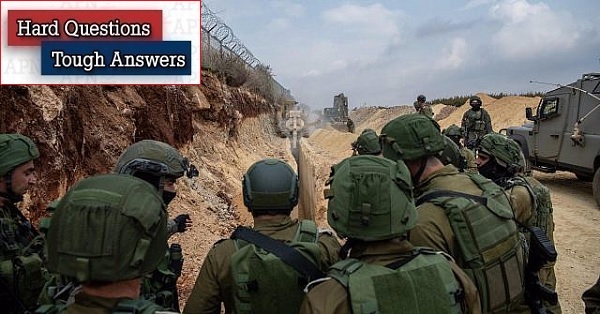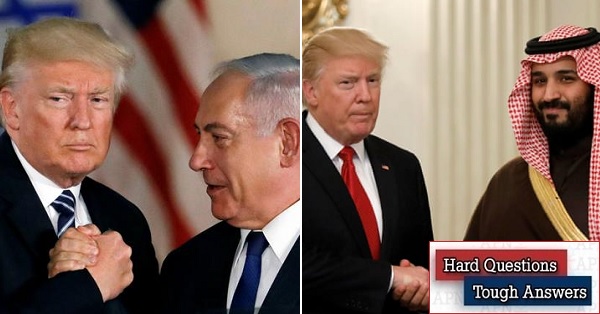Yossi Alpher is an independent security analyst. He is the former director of the Jaffee Center for Strategic Studies at Tel Aviv University, a former senior official with the Mossad, and a former IDF intelligence officer. Views and positions expressed here are those of the writer, and do not necessarily represent APN's views and policy positions.
Q. A week ago you described how the threat to Israel from the north is moving from Syria to Lebanon. Over the ensuing days Israel began unearthing Hezbollah tunnels into its territory. Is this a new dynamic pointing toward war? Deterrence? Reflecting Israeli domestic politics?
A. Conceivably, all of the above.
Last week we focused on Iran's efforts to supply sophisticated weaponry directly by air to Hezbollah in Lebanon
rather than via Syria. We also looked at the effort by Syrian President Bashar Assad to reassert Damascus's direct
influence in Beirut, and at the resultant stalemate in PM Hariri's prolonged effort to form a new governing
coalition.
Then, on Monday of last week, PM Netanyahu traveled without prior fanfare to Brussels where he met with US
Secretary of State Pompeo. The Israeli anti-tunnel campaign along the northern border commenced immediately upon
Netanyahu's return. Presumably, Netanyahu wanted to alert the Americans to the possible escalatory effect of
Israel's revelations.
Q. Why escalatory?
A. Residents of Israel's northern border settlements have long suspected, and warned, that they were being tunneled under. In revealing the tunnels, the IDF in effect confirmed that it had been monitoring Hezbollah's tunnel digging for months if not years. Still, the revelations had an escalatory effect insofar as they follow explicit Israeli warnings against Iran's missile buildup on Lebanese soil. Hezbollah was sufficiently alarmed for its second-in-command, Naim Qassem, to openly warn that "there is not a point in Israel not exposed to Hezbollah rockets".
Q. But even that warning is déjà vu and ritualistic, particularly when it's not clear what determined the timing of the decision to reveal the existence of the tunnels.
A. Here a large number of factors, some regional but most domestic, appear to come into
play. At the regional level, Israel is sending a deterrent message to the coalition of enemies it faces on the
north--Iran, Syria, Hezbollah. Even Russia can be considered here: Moscow is being informed that Israel is "one up"
on the Syria-based coalition Russia backs.
Still, the domestic political factors behind the tunnel revelations are more numerous and intriguing. Here we
recall that, not long ago, Netanyahu justified his reticence to get involved in a new Gaza war and his desire to
postpone new elections for as long as possible, with reference to his knowledge of delicate security issues the
public was not aware of. In displaying the Hezbollah tunneling project and alluding to more revelations to come,
Netanyahu is trying to demonstrate that he wasn't bluffing.
He is also presenting himself as the indispensable prime + defense + foreign minister. This image, if he can sell
it to the public, will help him soften the impact of the indictments on corruption charges that now seem
inevitable. Finally, reminding everyone in Israel, in Washington and in the Arab world of a constant threat from
the north reduces the likelihood of any conceivable pressure on Israel to deal more forthrightly with the
Palestinian issue, which in any case has been downgraded radically by the Iranian threat and by years of
revolutionary unrest in the Arab world.
Q. Yet as long as the tunnels can be presented as a Hezbollah failure, the tunnel affair is hardly likely to start a war.
A. Netanyahu does not want war in the north any more than he wants war with Gaza. In
dealing for years with both arenas he has proven admirably cautious.
The tunnel revelations are tactical in nature insofar as they represent but one aspect of Hezbollah's broader plans
to invade Israel's border settlements, which include a larger missile war with Israel that could involve Syria and
Iran as well. Focusing on the tunnels enables Netanyahu to avoid constantly dwelling on Hezbollah's missiles, which
constitute a formidable strategic threat and deterrent that all are aware can only be dealt with at a huge cost in
death and destruction inside Israel.
Involving UNIFIL, the United Nations force in southern Lebanon, with ample media coverage of Israel's complaints,
allows Israel to make the case that the UN has to step up its efforts, mandated by the 2006 ceasefire, to root out
Hezbollah aggression against Israel from Lebanon. Meanwhile Israel can more readily complete controversial
fortifications along the Lebanon border with UNIFIL sanction.
Then too, by taking charge of the tunnel issue with forceful public presentations, Netanyahu is quietly making the
case for remaining defense minister until next year's elections. This is reinforced in the public eye with media
coverage of the prime minister reviewing army units and meeting with IDF generals. This helps him rebuff criticism
that he has monopolized all key ministries for himself in megalomaniacal style.
Q. Granted that Israel is not about to attack Hezbollah over the tunnels. Their existence nevertheless raises the overall profile of Iran-sponsored aggressive intentions against Israel from the north. What are Israel's options for dealing with this integrated threat of huge missile barrages, attack tunnels and cross-border aggression by Iran and its proxies?
A. One possible Israeli option is to preempt and attack Hezbollah's missiles and Iran's
missile-guidance-upgrading installations on Lebanese soil before they can do much damage. Revealing the tunnels
gives Israel a viable casus belli. But this could plunge Israel into what looks like a "war by choice" with
unpredictable consequences. If Israel is going to suffer heavy losses and possibly compromise its relations with
Russia (which is embedded militarily nearby) and the Arab states (which will feel obliged to defend one of their
number), better that this happen in a war started clearly and directly by Iran and/or Hezbollah.
A second option is to internationalize: focus Arab and western pressure on Lebanon to "clean up its act" and bring
Hezbollah to heel before that movement brings disaster to the country. This could mean provoking a civil war in
Lebanon. That sort of meddling has proven disastrous for Israel in the past--recall the 1982 invasion. Nor does the
Lebanese polity appear to have the resilience necessary for confronting Hezbollah.
That leaves us with the current default option: attrition against Iranian ordnance supplies and Hezbollah tunnels
at the military level, coupled with pressure on Russia to restrain Iran and complaints to the UN to embarrass
Hezbollah and Lebanon. The desired outcome of this default option, the "war between wars", is deterrence.
Clearly, this delicate balancing act could go up in smoke as a consequence of even one reckless action by
Hezbollah, Syria or Iran, e.g., killing or capturing Israelis in a preemptive military or terrorist attack. That is
precisely what happened in July 2006, when a Hezbollah border ambush ignited a two-month war that left southern
Lebanon in rubble. Given the dangers represented by the Iran-Hezbollah buildup in Lebanon, such a reckless
initiative may be precisely what Israeli strategic planners are counting on.
Then too, there is conceivably a fourth option. According to unconfirmed reports, Russia is prepared to pressure
Iran to pull out of Syria and Lebanon, but only in return for Trump cancelling US-led sanctions against Iran. This
points to a possible superpower-level dimension to the growing Lebanon crisis that is largely beyond Israel's
control or influence.
Q. Indeed, where is the US in these options?
A. It's difficult to say. Netanyahu understandably wanted to touch base with Pompeo before beginning to destroy Hezbollah's tunnels. But this does not mean that the Trump administration can be counted on to, say, deter Russia from intervening, or to do a deal with Russia, or to intervene itself. In the unpredictable Trump era, Israel has to assume it is on its own in a Middle East crisis.
Q. Meanwhile, IDF restraint on two fronts appears to suit the cautious Netanyahu. But it caused his predecessor, Avigdor Liberman, to resign as defense minister on the grounds that the IDF leadership was behaving like "the leadership of Peace Now". What do you make of this accusation, recently leaked to the Israeli press?
A. I see this as a compliment to both Peace Now and the Israel Defense Forces. At least in Liberman's eyes, both are cautious regarding the excessive cost and frequently counterproductive nature of war, and both prefer to explore all peaceful options first, even with an implacable enemy like Hamas.


